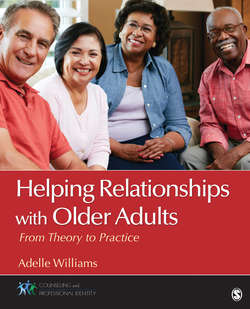Читать книгу Helping Relationships With Older Adults - Adelle M. Williams - Страница 32
На сайте Литреса книга снята с продажи.
Balance
ОглавлениеHaving good balance means being able to control and maintain your body’s position, whether you are moving or remaining still. An intact sense of balance helps you walk without staggering, get up from a chair without falling, climb stairs without tripping, and bend without falling (NIH Senior Health, 2014). Good balance is important to help elders move around, maintain independent functioning and carry out daily activities. As individuals get older, many people experience problems with their sense of balance. They feel dizzy or unsteady, or feel that their surroundings are in motion, and usually disturbances of the inner ear are a common cause (NIH Senior Health, 2014).
Balance problems in older persons can result in falls. Falls and fall-related injuries, such as hip fracture, can have a serious impact on an older person’s life. If the older person falls, it could limit his or her activities or make it impossible to live independently. Many persons often become more isolated after a fall. Additional consequences of balance are disruptions in normal sleep patterns, a cause for excessive fatigue, and balance disturbances can shorten your attention span and cause major disruptions in routine activities, social activities, and work and/or leisure activities. These limitations diminish the quality of life for older adults, and mental health practitioners can provide education, referral, and counseling to older clients. They can encourage older clients to obtain a comprehensive physical examination from their primary care provider, refer client for services as needed (e.g., occupational therapist), educate clients on their condition, conduct an assessment of the environment (identify potential environmental hazards), and support their clients in their efforts to cope with their condition.
Balance function declines with increasing age, but it is rarely the sole cause of falls in older persons. A person’s sense of balance is controlled by the vestibular (sensory) system that is affected by many diseases (e.g., diabetes, stroke, Parkinson’s disease) and is also sensitive to various combinations of medications, both prescription and over the counter (Besdine & Wu, 2008). In a normal healthy individual, our senses of touch (feet, ankles, and joints), sight (eyes), and inner ear motion sensors work together in harmony with the brain. A person with a balance disorder, however, may have a problem in any one of these systems or in multiple systems. The risk of developing one or more of these problems increases with age as our senses or brain centers are exposed to degenerative or infectious diseases or the effects of injuries accumulated over a lifetime. The natural aging process produces changes in our bodies as we grow older, but these changes do not necessarily result in a loss of balance control or mobility (Natus Balance & Mobility, 2015).
The response to both vestibular and kinesthetic stimuli (sensation of muscle contraction) is reduced in very old people. Vestibular sense receptors are located in muscles and tendons and relay signals to the central nervous system concerning joint motion and body position in space. Because both of these senses help maintain equilibrium, coordination, and body position, a diminution in their effectiveness produces a general unsteadiness, a lack of coordination in movements, and an increase in the amount of body sway. Because a longer time is required for stimuli to reach the central nervous system and be interpreted, and for messages then to be sent to the periphery, there is a great need for older adults to move slowly, have a wide stance, refrain from rapid body or head turning to maintain balance and prevent falls, and perhaps use a cane for support when walking. Older people should be instructed not to make quick changes in direction because such movements may cause loss of balance (Talbot & Hogstel, 2001). Maintaining good balance is critical for all older adults, and no living organism can exist without a fully functioning respiratory system.
